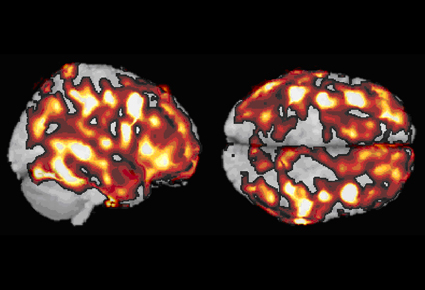A known risk factor and predictor of late-onset Alzheimer’s disease, Family History, according to studies, suggest a two-to fourfold greater risk for Alzheimer’s in those with a mother, father, brother or sister who develop the disease.
(Related: Bloomfield Hills Elder Lawyer Advice: Create a Personalized Healthcare Directive)
These first-degree relatives share close to 50 percent of their genes with another member of their family.
Common genetic variations like changes to the APOE gene account for nearly 50 percent of the heritability of Alzheimer’s, while the disease’s other genetic roots remain unexplained.
Published online in the journal PLOS ONE, the study confirms previous findings on a known genetic variation that increases an individual’s risk for Alzheimer’s, while also raising new questions regarding other genetic factors involved in the disease that are not yet identified.
(Related: Financial Elder Abuse)
It is estimated that 25 million people have Alzheimer’s disease worldwide, with the number expected to triple by 2050. More than 95 percent of these individuals have late-onset Alzheimer’s, usually occuring after the age of 65.
“In this study, we sought to understand whether simply having a positive family history, in otherwise normal or mildly forgetful people, was enough to trigger silent buildup of Alzheimer’s plaques and shrinkage of memory centers,” said senior author P. Murali Doraiswamy, professor of psychiatry and medicine at Duke.
(Related: There are Limitations on Special Needs Trusts)
Researchers at Duke Medicine contend that family members of people with Alzheimer’s disease are more than twice as likely than those without a family history to develop silent buildup of brain plaques associated with Alzheimer’s disease.
Erika J. Lampert, a Duke neuroscience research trainee, Doraiswamy and colleagues analyzed data from 257 adults, ages 55 to 89, both cognitively healthy and with varying levels of impairment. Participants were part of the Alzheimer’s Disease Neuroimaging initiative, a national study attempting to define the progression of Alzheimer’s through biomarkers.
(Related: Let’s Make Estate Planning Easier For Your Survivors)
“We already knew that family history increases one’s risk for developing Alzheimer’s, but we now are showing that people with a positive family history may also have higher levels of Alzheimer’s pathology earlier, which could be a reason why they experience a faster cognitive decline than those without a family history,” Lampert said.
Funding for the study was provided in part by the Alzheimer’s Disease Neuroimaging Initiative, a public-private partnership created with $60 million in grants from the National Institute on Aging , the National Institute of Biomedical Imaging and Bioengineering, the Food and Drug Administration, private pharmaceutical companies and non-profit organizations.
The post Duke Medicine Study Supports Family History and Risk for Alzheimer’s first appeared on SEONewsWire.net.]]>
It is estimated that five million seniors fall victim to financial abuse each year.
Getting a more precise picture of the extent of the problem is difficult because many seniors are unaware that the financial abuse is taking place, while others are unwilling to report it out of embarrassment or fear for their safety. What is financial abuse (also known as material exploitation)? It is defined as the illegal or improper use of an elderly person’s funds, property, or assets. Examples of this type of abuse include, but are not limited to:
(Related: There are Limitations on Special Needs Trusts)
-
Cashing an elderly person’s checks without authorization or permission
-
Forging an older person’s signature
-
Misuse or theft of an older person’s money or possessions
-
Deceiving or coercing an older person into signing any document (such as a contract, will, title, etc.)
-
The improper use of conservatorship or power of attorney
Maybe you suspect that an elderly family member or loved one is being subjected to some form of financial abuse but are not sure. Here are a few signs to look for:
(Related: Let’s Make Estate Planning Easier For Your Survivors)
-
Sudden changes in bank account or banking practice, particularly unexplained withdrawal of large sums of money when the older person is accompanied by another individual
-
Additional names being included on an elder’s bank signature card
-
Unauthorized withdrawal of the elder’s funds using the elder’s ATM card
-
Sudden changes to a will, trust, power of attorney, or other financial document
-
Disappearance of funds or valuable possessions that the elder person can’t, or won’t, explain
-
The elder person is receiving substandard care or accumulating unpaid bills even though adequate financial resources are available
(Related: Where Does Michigan Stand on Medicaid Expansion?)
-
Discovery of a forged signature for financial transactions or the titles of the elder person’s possessions
-
Sudden appearance of previously uninvolved relatives who claim to have rights to the elder person’s affairs and possessions
-
Sudden transfer of assets to a family member or someone outside the family that the elder person can’t explain
-
Provision of services to an elder person that do not seem to be necessary
If you suspect a loved one or someone you know is a victim to Financial Elder Abuse, contact us immediately to help evaluate the facts and ensure their safety and well being.
The post Financial Elder Abuse first appeared on SEONewsWire.net.]]>Can you and your family benefit from having an IRA trust as part of your overall plan?
An IRA trust can help you better control distributions after you pass away and restrict access to beneficiaries who might squander the funds of a large IRA. How? Let’s say your IRA is left directly to your beneficiaries outside of a trust. In this situation, your beneficiaries can immediately cash out your IRA and spend the money however they choose. The trouble is, when the IRA is cashed out, not only is the ability to stretch the required minimum distributions (RMDs) over the beneficiary’s lifetime lost, but all of the amount withdrawn will be taxable in the withdrawal year.
(Related: Oakland County Newlywed Planning for a Better Financial Future – A Few Simple Things to Do)
Or consider this scenario: If you name a minor grandchild as the direct beneficiary of your IRA, a guardianship or conservatorship will need to be established to manage the IRA until he or she reaches the age of 18. Then, when the grandchild reaches 18, he or she can withdraw all of what remains in the IRA. An IRA trust can put restrictions on how your IRA is spent, as well as when and how much a beneficiary can withdraw. This can provide important tax benefits if, for example, the beneficiary already has a taxable estate, since the IRA trust can be drafted to minimize or even eliminate estate taxes in the beneficiary’s own estate. In addition, the IRA trust has the potential to create an ongoing legacy for your family, because the IRA assets not used during a beneficiary’s lifetime can continue in trust for the benefit of the beneficiary’s descendants.
(Related: The Gift That Keeps On Giving: Paying Your Grandchildren’s College Tuition)
If you are in a second marriage, an IRA trust can prove particularly valuable. In a typical second marriage situation, you’ll want to leave your spouse the annual IRA income, but after his or her death you may well want to make sure that the IRA goes only to your children, not the children from the spouse’s first marriage. An IRA trust can help you accomplish this. Or what about a situation in which you dislike or do not trust your son or daughter in law? If you leave your IRA outright to your child, his or her spouse may be able to talk them into liquidating it. However, if you name a trust as the IRA beneficiary, your child won’t be able to liquidate the IRA—and suffer the potentially painful financial consequences.
(Related: Let’s Make Estate Planning Easier For Your Survivors)
Similarly, if you fear that your son or daughter is not yet mature enough to handle the money in your IRA, but you hope one day they will be, an IRA trust can allow you to name them as beneficiaries but put restrictions on how they can utilize the money.
Finally, even though IRAs are protected from the claims of creditors in many states, when the IRA account owner dies and the assets go to an individual beneficiary, the IRA loses its protected status. By putting these assets into a subtrust created for an individual beneficiary under the terms of an IRA trust, the assets will continue to be protected. The result? The IRA assets can remain intact for the benefit of the beneficiary in the event a lawsuit is filed against the beneficiary, if a married beneficiary later divorces, or if a single beneficiary gets married and later divorces.
(Related: Crisis Planning Worksheet to Support Caregivers)
To determine whether you and your family would benefit from having an IRA trust as part of your overall plan, please contact us for an initial consultation.
The post The Benefits Of An Ira Trust first appeared on SEONewsWire.net.]]>

